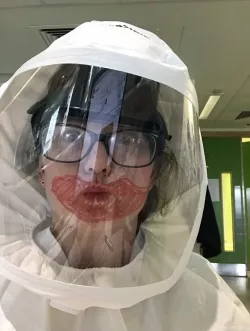This year has not been my year. Not that it has been anyone’s year. But as far as years go, I can only liken it to falling down the stairs, over a bannister and landing in a wheelie bin of clinical waste. I was doing specialty training and had fallen pregnant following fertility treatment. Life was busy but good. Then things changed fast. I went from having some lower abdominal pain to being diagnosed with a ruptured ectopic and being rushed into theatre in haemorrhagic shock. I was kept in until my obs were better and then off I went home, problem solved. I didn’t cry for three days. It wasn’t just the loss of a pregnancy, the loss of some fertility and emergency surgery. I had nearly died. I told myself a few weeks of recovering and then I would access all the help I needed. And then COVID happened. I was then stuck at home, isolated from everyone, unable to see my GP, to access counselling or to get any sense of normality back in my life. I was off for 3 months altogether, and I used my time off to try to acknowledge and overcome the loss and trauma that I had gone through before returning back to work. And the advice is fairly repetitive. Sleep for 7-8 hours a day, eat healthily, exercise regularly. If these things were so easy, wouldn’t we all be strutting around like Joe Wicks with a six-pack, a stethoscope, a big smile and a smoothie??
So. This is what I have learnt.
1. Learn to say no
This is a hard one for us as dedicated problem solvers, but do you know what? It is ok to just do your basic job for a period of time and not take on any extra if that is what you need to do. Giving yourself that bit less to do when already feeling overwhelmed is priceless, and we are absolutely justified to ask for that.
2. Assess and adjust your social media
It can be interesting and entertaining but it can also make us feel inadequate, stressed and intruded upon our time off away from work. I gave myself a social media holiday with minimal reading of current affairs giving me the time I needed to focus on me and not worry about the rest of the world nor to feel judged by it.
3. Speak to those at work
You will not be the first person to struggle and you will not be the last. Have a think about your team, who you know and decide who would be best to speak to. Acknowledging the struggle is one of the hardest things to do, so even this first step is massive. Do it.
4. Consider additional sources of support
Within our jobs, we have access to Occupational Health. We have access to Professional Support Units. It is not for all, but through this my perspectives have changed and I feel a lot stronger to tackle what life throws at me. Think about it.
5. Look at your time management
It is easy to fall in to the trap of doing work related things on your days off. I went to a course where they chatted about time management and it made me think, could I be more constructive with my time? And the answer was yes. I now make a list of jobs and allocate one or two things to every weekday. The result: you mostly CAN squeeze these things in, better defining work time and your time.
6. Consider speaking to your GP
We are doctors, but we are also patients. And it is worth thinking about if we too need help medically. There is no shame in it, no one need know about it and if seeing your GP and considering additional forms of support or even medication helps your quality of life, why would you not.
7. Speak to your friends and family
It sounds basic I know, but we don’t always do it. There is the fear of feeling as though you are whinging and yes, we all know people worse off than ourselves but that does not take away from the stresses or the struggle in our own lives. You would listen to others without judgement, so let them.
8. Do something you enjoy each week
Someone asked one of my tutors what had she learnt that she wish she had learnt earlier. And she her answer was to do something you love for one hour a week, because to have that small fragment of happiness and to be that person that you are is so important. It is small, it is meaningless, it is important.
9. Reward yourself
When did you last treat yourself? Genuinely spoil yourself for being such a good adult? Some new clothes. That drum-set that you always promised yourself that you would buy when you were big and had the money. Life is tough. And it isn’t always that kind. So do it. Amazon do 3kg bags of Haribo don’t you know….
10. Look at your perspectives
An easy statement. And not so easy to do. But by changing your perspectives you can change your whole outlook on life. One of the best things I got told was to look at what was bothering me: could I change it? And if not, could I let it go? I am much more decisive about what to worry about now.
I don’t pretend to be a shining example. I still have sad days, I still have bad days and I still have the odd day where I just need to take time out. But these were the things that I found useful and I just wondered if anyone would benefit from reading something that is honest, genuine, practical and pre-tested. All the best.











